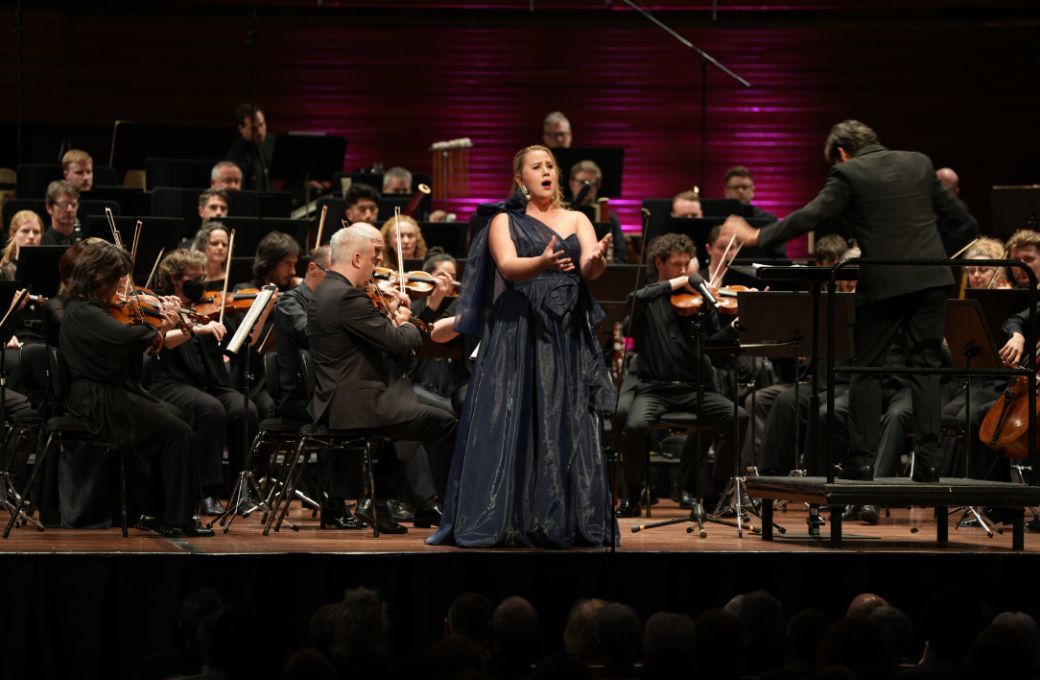2024 marks the 100th anniversary of the death of Giacomo Puccini, and the New Zealand Symphony Orchestra marked the occasion with a gala of some of Puccini’s best-known operatic arias. This was led not by established names in the opera firmament, but with a pair of promising young singers. Australian tenor Paul O’Neill and local Kiwi soprano Eliza Boom were both game participants, but it was Boom who came closer to fulfilling the demands of Puccini’s music and characters. The orchestra, led by José Luis Gómez, gave sterling support and offered some of the evening’s highlights in their performances of orchestral excerpts from Verdi, Mascagni and Leoncavallo as well as Puccini himself.

O’Neill, who has been singing lead roles in opera houses in Germany and Australia, presented a firm tenor voice with a keen sense of pitch. He started off with a superb “Recondita armonia” from Tosca that filled out the long phrases superbly, rising to a ringing B flat. But he wasn’t quite able to maintain this standard throughout the rest of the programme. His upper register didn’t always ring out over the orchestra (neither he nor Boom were quite able to make their full effect over the orchestral backing in the Butterfly duet) and he seemed to save his reserves for the climactic notes, thereby sacrificing line and tonal body in some of the lower-lying parts of his arias. He sped through “Donna non vidi mai” from Manon Lescaut so quickly that it made little impact and some of the lower sections of “Nessun dorma” were insufficiently audible.
Boom is at the outset of what is certainly a promising career, based on the vocal ease she demonstrated through much of the evening. Her soprano is perhaps a little lean in tone for Tosca’s great emotional outpourings, but it’s a lovely sound and there was no lack of feeling in the interpretation of the Roman singer. She was shown in a better light in Butterfly’s showpiece aria “Un bel di vedremo”, in which Butterfly’s vulnerability and yearning were clear and the final phrases rose to an intense peak of glowing sound. Even better was her Mimì in the second half of the concert. This feels like a role she was born to play, from the shyness of her initial introduction to Rodolfo through to the warm, glowing outburst at “ma quando vien lo sgelo”. Similarly, her shimmering soprano made the most her entrance in the duet with O’Neill. Finally, she made for an adorable Lauretta from Gianni Schicchi, sailing through the vocal demands with ease, and really embodying the young woman pleading with her father.
The orchestra was on superb form throughout, providing thrilling climaxes in the arias and duets where the strings so often double Puccini’s singers. The solo items too were exciting. In the Verdi overtures, Gómez kept things moving with pulsing momentum. The overture to La Forza del Destino was given a gripping performance from the opening brass motif and the brass also impressed in the Nabucco. Gómez eschewed over-sentimentality in the evergreen Intermezzo from Cavalleria Rusticana, creating a more loving moving vignette than most performances of this piece, which are more extroverted. The highlight was the way the orchestra swept thrillingly through the gorgeous melody of the Pagliacci Intermezzo, harking back to the same opera’s Prologue. With the orchestra in such fine form, it was a pity that the singers couldn’t always match it, but the potential of Eliza Boom as a Puccini singer for the future should not be ignored.


